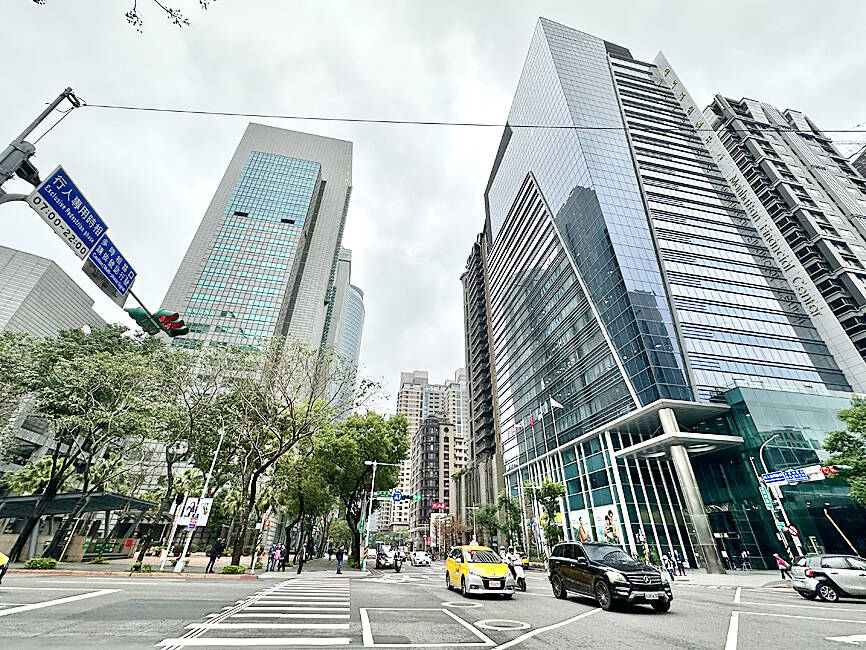Housing agency Hiyes International Co (海悅國際開發) and elevator maker Golden Friends Corp (崇友實業) are expecting stable business growth this year, as the local property market steadily emerges from a slowdown induced by economic uncertainty and tight monetary policy.
Hiyes said business visibility is better this quarter from a year earlier, judging by agency cases and construction revenue.
Things might be quieter during the second quarter of the year, as developers would seek to digest unsold houses and launch major presale projects in the third and fourth quarters that would generate billions of revenue, it said.

Photo: CNA
Hiyes said it is cautiously assessing whether to undertake urban renewal projects in Taipei and New Taipei City in a bid to diversify its income sources and strengthen its competitive edge.
The company in December last year recognized construction revenue of NT$2.47 billion (US$78.02 million) from a mixed-use complex in Taichung, which helped boost net income to NT$1.66 billion for the whole of last year, or earnings per share of NT$13.86.
The results represent a 77.16 percent improvement from 2022 on the back of strong demand after the government in August last year introduced interest subsidies and other favorable lending terms for first-home purchases regardless of the age of the buyer.
Hiyes last week said that it plans to distribute a NT$7 per share in cash dividend and another NT$2 stock dividend from last year’s earnings, equivalent to a payout ratio of 64.9 percent.
Elevator maker Golden Friends last week posted record-high earnings per share of NT$5.06 for last year, up 5.57 percent from a year earlier, thanks to stable demand, maintenance requirements and the divestment of an office building in Kaohsiung.
Revenue last year grew 11.16 percent to NT$5.27 billion, the company said, due to more elevator demand from new residential complexes and office buildings.
The company has proposed distributing a NT$4 per share cash dividend from last year’s earnings, indicating a payout ratio of 80 percent.
The company said it has a guarded, but optimistic view for this year with ample orders on hand that would provide profit momentum.
The company said that it is to introduce artificial intelligence and environment-friendly technologies when developing new elevators.

Taiwan will prioritize the development of silicon photonics by taking advantage of its strength in the semiconductor industry to build another shield to protect the local economy, National Development Council (NDC) Minister Paul Liu (劉鏡清) said yesterday. Speaking at a meeting of the legislature’s Economics Committee, Liu said Taiwan already has the artificial intelligence (AI) industry as a shield, after the semiconductor industry, to safeguard the country, and is looking at new unique fields to build more economic shields. While Taiwan will further strengthen its existing shields, over the longer term, the country is determined to focus on such potential segments as

UNCERTAINTY: Innolux activated a stringent supply chain management mechanism, as it did during the COVID-19 pandemic, to ensure optimal inventory levels for customers Flat-panel display makers AUO Corp (友達) and Innolux Corp (群創) yesterday said that about 12 to 20 percent of their display business is at risk of potential US tariffs and that they would relocate production or shipment destinations to mitigate the levies’ effects. US tariffs would have a direct impact of US$200 million on AUO’s revenue, company chairman Paul Peng (彭雙浪) told reporters on the sidelines of the Touch Taiwan trade show in Taipei yesterday. That would make up about 12 percent of the company’s overall revenue. To cope with the tariff uncertainty, AUO plans to allocate its production to manufacturing facilities in

COLLABORATION: Given Taiwan’s key position in global supply chains, the US firm is discussing strategies with local partners and clients to deal with global uncertainties Advanced Micro Devices Inc (AMD) yesterday said it is meeting with local ecosystem partners, including Taiwan Semiconductor Manufacturing Co (TSMC, 台積電), to discuss strategies, including long-term manufacturing, to navigate uncertainties such as US tariffs, as Taiwan occupies an important position in global supply chains. AMD chief executive officer Lisa Su (蘇姿丰) told reporters that Taiwan is an important part of the chip designer’s ecosystem and she is discussing with partners and customers in Taiwan to forge strong collaborations on different areas during this critical period. AMD has just become the first artificial-intelligence (AI) server chip customer of TSMC to utilize its advanced

Chizuko Kimura has become the first female sushi chef in the world to win a Michelin star, fulfilling a promise she made to her dying husband to continue his legacy. The 54-year-old Japanese chef regained the Michelin star her late husband, Shunei Kimura, won three years ago for their Sushi Shunei restaurant in Paris. For Shunei Kimura, the star was a dream come true. However, the joy was short-lived. He died from cancer just three months later in June 2022. He was 65. The following year, the restaurant in the heart of Montmartre lost its star rating. Chizuko Kimura insisted that the new star is still down